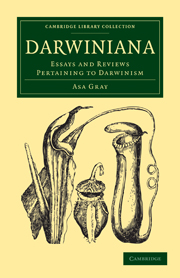Book contents
- Frontmatter
- PREFACE
- Contents
- ARTICLE I THE ORIGIN OF SPECIES BY MEANS OF NATURAL SELECTION
- ARTICLE II DESIGN versus NECESSITY—A DISCUSSION
- ARTICLE III NATURAL SELECTION NOT INCONSISTENT WITH NATURAL THEOLOGY
- ARTICLE IV SPECIES AS TO VARIATION, GEOGRAPHICAL DISTRIBUTION, AND SUCCESSION
- ARTICLE V SEQUOIA AND ITS HISTORY: THE RELATIONS OF NORTH AMERICAN TO NORTH-EASTERN ASIAN AND TO TERTIARY VEGETATION
- ARTICLE VI THE ATTITUDE OF WORKING NATURALISTS TOWARD DARWINISM
- ARTICLE VII EVOLUTION AND THEOLOGY
- ARTICLE VIII “WHAT IS DARWINISM?”
- ARTICLE IX CHARLES DARWIN: SKETCH ACCOMPANYING A PORTRAIT IN “NATURE”
- ARTICLE X INSECTIVOROUS PLANTS
- ARTICLE XI INSECTIVOROUS AND CLIMBING PLANTS
- ARTICLE XII DURATION AND ORIGINATION OF RACE AND SPECIES
- ARTICLE XIII EVOLUTIONARY TELEOLOGY
- INDEX
ARTICLE X - INSECTIVOROUS PLANTS
Published online by Cambridge University Press: 05 October 2010
- Frontmatter
- PREFACE
- Contents
- ARTICLE I THE ORIGIN OF SPECIES BY MEANS OF NATURAL SELECTION
- ARTICLE II DESIGN versus NECESSITY—A DISCUSSION
- ARTICLE III NATURAL SELECTION NOT INCONSISTENT WITH NATURAL THEOLOGY
- ARTICLE IV SPECIES AS TO VARIATION, GEOGRAPHICAL DISTRIBUTION, AND SUCCESSION
- ARTICLE V SEQUOIA AND ITS HISTORY: THE RELATIONS OF NORTH AMERICAN TO NORTH-EASTERN ASIAN AND TO TERTIARY VEGETATION
- ARTICLE VI THE ATTITUDE OF WORKING NATURALISTS TOWARD DARWINISM
- ARTICLE VII EVOLUTION AND THEOLOGY
- ARTICLE VIII “WHAT IS DARWINISM?”
- ARTICLE IX CHARLES DARWIN: SKETCH ACCOMPANYING A PORTRAIT IN “NATURE”
- ARTICLE X INSECTIVOROUS PLANTS
- ARTICLE XI INSECTIVOROUS AND CLIMBING PLANTS
- ARTICLE XII DURATION AND ORIGINATION OF RACE AND SPECIES
- ARTICLE XIII EVOLUTIONARY TELEOLOGY
- INDEX
Summary
That animals should feed upon plants is natural and normal, and the reverse seems impossible. But the adage, “Natura non agit saltatim,” has its application even here. It is the naturalist, rather than Nature, that draws hard and fast lines everywhere, and marks out abrupt boundaries where she shades off with gradations. However opposite the parts which animals and vegetables play in the economy of the world as the two opposed kingdoms of organic Nature, it is becoming more and more obvious that they are not only two contiguous kingdoms, but are parts of one whole—antithetical and complementary to each other, indeed; but such “thin partitions do the bounds divide” that no definitions yet framed hold good without exception. This is a world of transition in more senses than is commonly thought; and one of the lessons which the philosophical naturalist learns, or has to learn, is, that differences the most wide and real in the main, and the most essential, may nevertheless be here and there connected or bridged over by gradations. There is a limbo filled with organisms which never rise high enough in the scale to be manifestly either animal or plant, unless it may be said of some of them that they are each in turn and neither long.
- Type
- Chapter
- Information
- DarwinianaEssays and Reviews Pertaining to Darwinism, pp. 289 - 307Publisher: Cambridge University PressPrint publication year: 2009First published in: 1876



